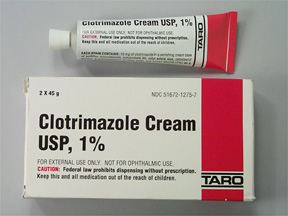
Tm-clotrimazole Coupons & Savings Card – Discount Prices from $4.72
Brand for: Clotrimazole
My prescription
Edit
14.2GM of 1%, Clotrimazole (1 Tube)
Select pharmacy

CVS
$19.59
COUPON PRICE
Walmart
$4.72
COUPON PRICE
Albertsons
$7.50
COUPON PRICE
Walgreens
$10.36
COUPON PRICETm-clotrimazole savings card
Show this card to your pharmacist
Walmart
$4.72
BIN
ID
PCN
GRP
019876
LHC15337BA
CHIPPO
LHX
Powered by
Tm-clotrimazole (Clotrimazole) dosage forms
Dosage Quantity Price from Per unit 14.2GM 1 Tube $4.72 $4.72 14.2GM 2 Tubes $6.93 $3.46 14.2GM 3 Tubes $9.15 $3.05
| Dosage | Quantity | Price from | Per unit |
|---|---|---|---|
| 14.2GM | 1 Tube | $4.72 | $4.72 |
| 14.2GM | 2 Tubes | $6.93 | $3.46 |
| 14.2GM | 3 Tubes | $9.15 | $3.05 |
Tm-clotrimazole Warnings
Clotrimazole is an antifungal medication commonly used to treat various fungal infections. While generally safe, it's important to be aware of certain risks and precautions associated with its use.
Allergic Reactions: Individuals with a known hypersensitivity to clotrimazole or other imidazole antifungals should avoid using this medication. Signs of an allergic reaction may include rash, itching, swelling, dizziness, or difficulty breathing. If any of these symptoms occur, discontinue use and seek immediate medical attention.
Application Precautions: Clotrimazole is intended for external use only. Avoid contact with the eyes, mouth, or other mucous membranes. If accidental contact occurs, rinse thoroughly with water. Do not apply the medication to broken or irritated skin unless directed by a healthcare provider.
Use During Pregnancy and Breastfeeding: Topical clotrimazole is generally considered safe during pregnancy, particularly in the second and third trimesters. However, it's advisable to consult a healthcare provider before use, especially during the first trimester. While minimal amounts of the drug are expected to pass into breast milk, nursing mothers should seek medical advice before using clotrimazole.
Pediatric Use: The safety and efficacy of clotrimazole in children under 3 years of age have not been established. Therefore, its use in this age group is not recommended unless prescribed by a healthcare provider.
Contraceptive Considerations: Vaginal clotrimazole preparations may weaken latex condoms and diaphragms, potentially reducing their effectiveness in preventing pregnancy and sexually transmitted infections. Alternative contraceptive methods should be considered during treatment.
Monitoring and Duration of Use: If symptoms do not improve within the recommended treatment period—typically two weeks for jock itch and four weeks for athlete's foot or ringworm—discontinue use and consult a healthcare provider. Prolonged or inappropriate use can lead to reduced effectiveness and potential complications.
By adhering to these precautions and consulting with a healthcare provider when necessary, the risks associated with clotrimazole can be minimized, ensuring safe and effective treatment.
Tm-clotrimazole Side Effects
When using this medication, you might experience some mild side effects such as burning, stinging, swelling, irritation, redness, pimple-like bumps, tenderness, or flaking of the treated skin. These are generally not serious and often resolve on their own. However, if these effects persist or worsen, it is advisable to consult your healthcare provider. In rare cases, more severe side effects can occur. If you notice any signs of blistering, oozing, or open sores, it's crucial to seek medical attention immediately. Allergic reactions to this medication are very uncommon, but if you experience symptoms like a rash, itching or swelling (particularly of the face, tongue, or throat), severe dizziness, or difficulty breathing, urgent medical help is necessary. Remember, this is not an exhaustive list of potential side effects. If you observe any other unusual symptoms, it is important to discuss them with your doctor or pharmacist to ensure your safety and well-being.
Tm-clotrimazole Interactions
Clotrimazole, an antifungal medication, can interact with various drugs, potentially altering their effects. Notably, when used alongside Tacrolimus, an immunosuppressant commonly prescribed to transplant patients, clotrimazole can significantly increase tacrolimus blood levels. This interaction may heighten the risk of tacrolimus-related side effects, such as kidney problems, high blood pressure, and neurological issues. Therefore, patients on tacrolimus should be closely monitored if they start or stop using clotrimazole, with adjustments to tacrolimus dosing made as necessary.
Additionally, clotrimazole may interact with other medications metabolized by the liver enzyme CYP3A4. For instance, combining clotrimazole with cisapride, a medication used for certain gastrointestinal conditions, can increase the risk of serious heart rhythm disturbances. Similarly, clotrimazole can elevate blood levels of Sirolimus, another immunosuppressant, potentially leading to increased side effects. Patients taking these medications should consult their healthcare provider before using clotrimazole to ensure safe and effective treatment.
What is clotrimazole used to treat?
Clotrimazole is used to treat fungal infections. It is commonly applied to the skin to treat conditions such as athlete's foot, jock itch, and ringworm. It can also be used to treat yeast infections, including those affecting the mouth and throat.
What types of infections can be treated with clotrimazole?
Clotrimazole is an antifungal medication used to treat various fungal infections. It is commonly used for treating infections such as athlete's foot, jock itch, ringworm, and yeast infections, including vaginal yeast infections and oral thrush.
What is the main use of clotrimazole?
Clotrimazole is primarily used as an antifungal medication to treat various fungal infections, such as athlete's foot, jock itch, ringworm, and yeast infections. It works by inhibiting the growth of fungi, thereby alleviating symptoms and clearing the infection.
When should you not use clotrimazole?
Clotrimazole should not be used by individuals who are allergic to it or any of its components. It is also advisable to avoid using clotrimazole on broken or irritated skin unless directed by a healthcare provider. Pregnant or breastfeeding individuals should consult a healthcare professional before using clotrimazole. Additionally, it should not be used in the eyes, mouth, or on the face. If symptoms persist or worsen, it is important to seek medical advice.
